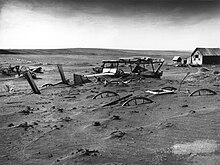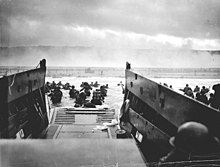-

اتبعني
تابعني على تويتر
-

التدوينات RSS
اشترك في خدمة RSS
-

فيس بوك
انضم للمعجبين في FACEBOOK
Pages
اين انت .... » الرئيسية »
World news
» World War I, Great Depression, and World War
World War I, Great Depression, and World War
الأحد، 14 نوفمبر 2010
التسميات:
World news
At the outbreak of World War I in 1914, the United States remained neutral. Most Americans sympathized with the British and French, although many opposed intervention.[37] In 1917, the United States joined the Allies, helping to turn the tide against the Central Powers. After the war, the Senate did not ratify the Treaty of Versailles, which established the League of Nations. The country pursued a policy of unilateralism, verging on isolationism.[38] In 1920, the women's rights movement won passage of a constitutional amendment granting women's suffrage. The prosperity of the Roaring Twenties ended with the Wall Street Crash of 1929 that triggered the Great Depression. After his election as president in 1932, Franklin D. Roosevelt responded with the New Deal, a range of policies increasing government intervention in the economy. The Dust Bowl of the mid-1930s impoverished many farming communities and spurred a new wave of western migration.
The United States, effectively neutral during World War II's early stages after Nazi Germany's invasion of Poland in September 1939, began supplying materiel to the Allies in March 1941 through the Lend-Lease program. On December 7, 1941, the Empire of Japan launched a surprise attack on Pearl Harbor, prompting the United States to join the Allies against the Axis powers as well as the internment of Japanese Americans by the thousands.[39] Participation in the war spurred capital investment and industrial capacity. Among the major combatants, the United States was the only nation to become richer—indeed, far richer—instead of poorer because of the war.[40] Allied conferences at Bretton Woods and Yalta outlined a new system of international organizations that placed the United States and Soviet Union at the center of world affairs. As victory was won in Europe, a 1945 international conference held in San Francisco produced the United Nations Charter, which became active after the war.[41] The United States, having developed the first nuclear weapons, used them on the Japanese cities of Hiroshima and Nagasaki in August. Japan surrendered on September 2, ending the war.[42]
Cold War and protest politics
The United States and Soviet Union jockeyed for power after World War II during the Cold War, dominating the military affairs of Europe through NATO and the Warsaw Pact. The United States promoted liberal democracy and capitalism, while the Soviet Union promoted communism and a centrally planned economy. Both supported dictatorships and engaged in proxy wars. American troops fought Communist Chinese forces in the Korean War of 1950–53. The House Un-American Activities Committee pursued a series of investigations into suspected leftist subversion, while Senator Joseph McCarthy became the figurehead of anticommunist sentiment.The 1961 Soviet launch of the first manned spaceflight prompted President John F. Kennedy's call for the United States to be first to land "a man on the moon", achieved in 1969. Kennedy also faced a tense nuclear showdown with Soviet forces in Cuba. Meanwhile, the United States experienced sustained economic expansion. A growing civil rights movement, symbolized and led by African Americans such as Rosa Parks, Martin Luther King, Jr., and James Bevel, used nonviolence to confront segregation and discrimination. Following Kennedy's assassination in 1963, the Civil Rights Act of 1964 and Voting Rights Act of 1965 were passed under President Lyndon B. Johnson. Johnson and his successor, Richard Nixon, expanded a proxy war in Southeast Asia into the unsuccessful Vietnam War. A widespread countercultural movement grew, fueled by opposition to the war, black nationalism, and the sexual revolution. Betty Friedan, Gloria Steinem, and others led a new wave of feminism that sought political, social, and economic equality for women.
As a result of the Watergate scandal, in 1974 Nixon became the first U.S. president to resign, to avoid being impeached on charges including obstruction of justice and abuse of power; he was succeeded by Vice President Gerald Ford. The Jimmy Carter administration of the late 1970s was marked by stagflation and the Iran hostage crisis. The election of Ronald Reagan as president in 1980 heralded a rightward shift in American politics, reflected in major changes in taxation and spending priorities. His second term in office brought both the Iran-Contra scandal and significant diplomatic progress with the Soviet Union. The subsequent Soviet collapse ended the Cold War.




















0 التعليقات:
إرسال تعليق